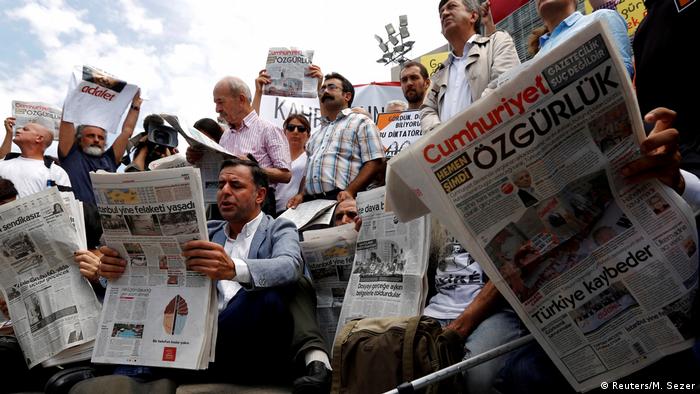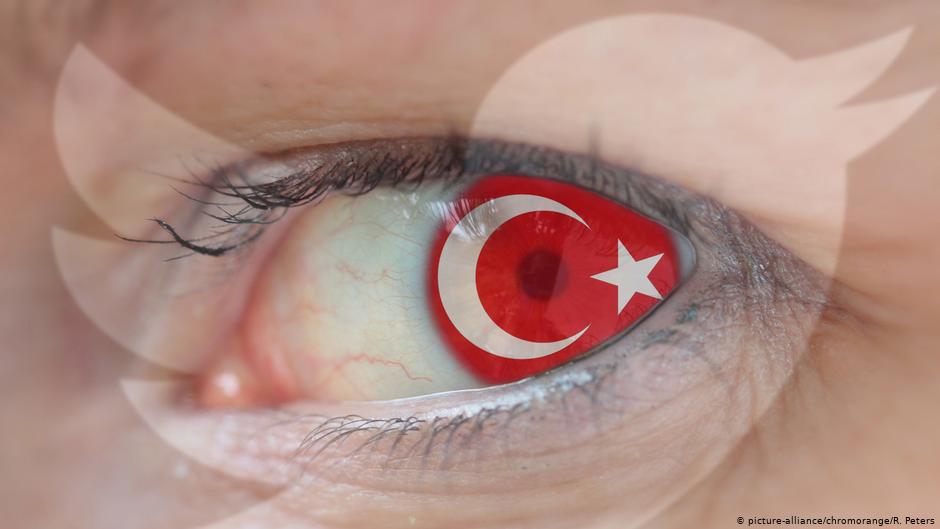New regulations came into effect on October 1 in Turkey stipulating that social media providers with over a million Turkish daily users must open offices or appoint a legal representative in the country. If companies do not comply with the new rules, they face major fines.
The rules, which were pushed through Parliament by the Justice and Development Party (AKP) of Prime Minister Recep Tayyip Erdogan, threaten major social media platforms like Facebook and Twitter, among others.
While at first glance the regulations appear bureaucratic, critics say that in practice they encroach upon company rights and freedom of speech.
Yaman Akdeniz, who teaches law at Istanbul’s Bilgi University, one of the leading private universities in Turkey, told DW that the regulations would have major consequences. “In the worst-case scenario, a court ruling could lead to platforms being removed,” he said.

Cyber expert Yaman Akdeniz
Akdeniz added that companies who fail to comply with the regulations risk incurring fines of over €4 million ($4.6 million) by December 2021.
He also explained that the authorities had introduced a ban on advertising: “That means that nobody can advertise on these platforms.” Furthermore, the authorities would restrict bandwidths “so as to make access to the platforms almost impossible,” he added.
The new regulations come on top of a law passed in July that already forces platforms such as Facebook, Twitter or Instagram to react to requests to delete or block certain contents within 48 hours. The ruling AKP has said that the law is aimed at preventing online insults and harassment.
Tightening censorship
However, Emma Sinclair-Webb, an expert on Turkey at Human Rights Watch, is skeptical about this argument and says the government is simply trying to tighten censorship. She pointed out that many people living in Turkey use social media to access information that is not available in traditional media — especially information that takes a critical view of the government.
As critical debate has all but disappeared from traditional media, digital platforms have grown more important. According to Germany’s Foreign Office, about 90% of Turkey’s media outlets are linked to the AKP through personal or financial contacts.
The remaining newspapers and broadcasters have reportedly been starved of financing through tactics that include threatening customers who take out ads. Independent media outlets that used to be openly critical have begun to exercise more self-censorship.
Turkey is now ranked 154 of 180 in Reporters Without Border’s World Press Freedom Index.

The opposition newspaper Cumhuriyet has been targeted over the years as the AKP has sought to stifle critical voices
Comparisons with German law
Ankara has argued that the new legislation is based on Germany’s Network Enforcement Act, or NetzDG law, which obliges internet platforms to take a more active stance against incitement to hatred and violence and terrorist propaganda. Clearly criminal content has to be deleted within 24 hours, and platforms have to react to user complaints within 48 hours. Additionally, companies must publish a report every six months about how they have managed such issues.
Sinclair-Webb rejects Ankara’s comparison to German law, saying the situation is very different in Germany, where there is a clear separation of powers and an independent judiciary.
Dysfunctional judiciary
Sinclair-Webb’s view is shared by Germany’s Foreign Ministry. In a classified report written this summer that reviewed conditions in the main origin countries of asylum-seekers, the ministry described Turkey’s judiciary as largely dysfunctional and under political influence. The report, which was seen by German media, added that freedom of speech was almost nonexistent.
Akdeniz said that if Facebook and other social media platforms were to open up offices in Turkey, they would “risk becoming part of the Turkish judiciary’s long arm,” because their content would have to comply with every officially ordered restriction or blockade.
He said the companies would subsequently also risk having to face “a whole flood of hundreds of slander and libel complaints [from concerned users] in the courts.” Moreover, they would likely “be accused of private censorship since they would be required to deal with each complaint immediately.”
This article has been adapted from German.
Source: DW



